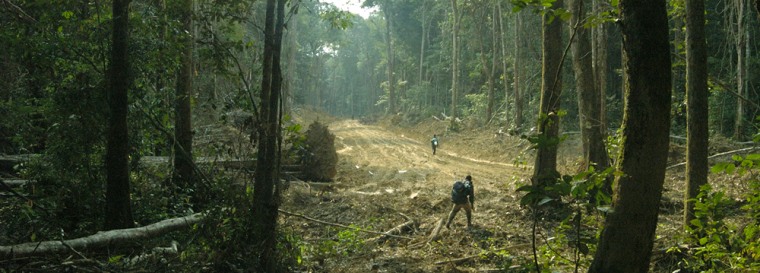New roads across Central Africa are forcing endangered forest elephants into smaller and smaller habitat areas, a study released Monday found. It's not vehicles that are a danger, instead the intelligent animals seem to know that the roads bring poachers.
"Forest elephants are basically living in fear of their lives in prisons created by roads. They are roaming around the woods like frightened mice rather than tranquil formidable giants of their forest realm," Stephen Blake, the study’s lead author, said in a statement released by the Wildlife Conservation Society.
The researchers found that forest elephants have adopted a "siege mentality" forcing populations to become increasingly confined and isolated, potentially undermining efforts to protect the animals.
"Forest elephants are under siege with all of the graphic images that go with it — increasing the likelihood of fear, starvation, disease, massive stress, infighting, and social disruption," Blake said.
Roads pose threat, barrier
The study tracked 28 forest elephants with GPS collars and found that roads, particularly those outside of protected areas, have become formidable barriers to elephant movements. Just one of the 28 elephants crossed a road outside of a protected area and it did so at 14 times its normal speed.
"The siege strategy may reduce the risk from poaching, but as roadless space decreases, it will likely result in loss of access to food and important mineral deposits," the Wildlife Conservation Society stated. "This will most likely result in aggressive negative behavior among elephants from different social groups, which in turn can affect reproductive success. Other negative impacts include overgrazing of local vegetation and reduced seed dispersal by elephants, which is vital to helping regenerate forests."
Since the study, new road construction has entered previously roadless wilderness areas in three of the six study sites in Republic of Congo and neighboring Gabon, the society said.
The experts urged officials to divert roads away from wilderness areas.
“Planning roads to give forest elephants breathing space so that at least those in the deep forest can relax, as well as reduce the death and fear that comes with roads by reducing poaching, would be trivial in terms of cost but massively important for conservation,” Blake said.
The study, which appears in the October 27th issue of the journal Public Library of Science, was funded bythe Wildlife Conservation Society and the group Save the Elephants.
